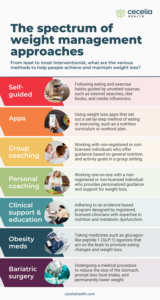By Dr. Arnold Saperstein, CMO
When it comes to weight loss, there are a variety of approaches that people take, from self-guided diets to obesity medications. None are simple — each path requires individualized care plus diet and lifestyle change for participants to reach and maintain a healthy weight. Simply put, losing weight is hard, and maintaining that weight loss once achieved is even harder.
The various methods of weight management can be differentiated by the level of professional and medical intervention involved. Here’s a quick run-down from least interventionist to most:
- Self-guided: Following eating and exercise habits guided by unvetted sources such as internet searches, diet books, and media influencers.
- Apps: Using weight loss apps that set out a set-by-step method of eating or exercising, such as a nutrition curriculum or workout plan.
- Group coaching: Working with non-registered or non-licensed individuals who offer guidance or support based on general nutrition and activity goals in a group setting.
- Personal coaching: Working one-on-one with a non-registered or non-licensed individual who provides personalized guidance and support for weight loss.
- Clinical support and education. Adhering to an evidence-based program designed by registered, licensed clinicians with expertise in nutrition and metabolic dysfunction.
- Obesity medications: Taking medicines such as glucagon-like peptide 1 (GLP-1) agonists that act on the brain to promote eating changes and weight loss.
- Bariatric surgery: Undergoing a medical procedure to reduce the size of the stomach, prompt less food intake, and permanently lower weight.
It’s important to note that these approaches can be combined in various ways. Some people looking to lose weight might use both a weight loss app and personal coaching to stay on track. Some may seek out obesity medications and also follow a self-guided eating or exercise regimen that they hope will promote better health.
Regardless of which method (or methods of weight management) an individual uses, however, the best outcomes will accrue to those who have clinical support and education as part of their weight-loss intervention plan. This is not only true of those who haven’t previously experienced clinical guidance; it is also the case for those who are pursuing surgery or GLP-1 approaches.
Clinical support and education are key to optimizing the effectiveness of any particular weight-loss intervention. Yet unfortunately getting access to this level of care may be difficult for some, especially those whose BMI or other metabolic indicators don’t indicate a clear health risk. And for others, clinical care may seem forbidding, unnecessary, or out-of-reach.
Providers who are designing weight management solutions should consider the particulars of the population they serve, as there are a number of factors that can influence how people approach (or avoid) weight loss interventions. Social determinants of health (SDOH)—the conditions of people’s lives that impact their health—are major players in people’s approach to weight loss. For example, level of education, financial resources, and age can determine whether or not a person sees clinical care as a viable pathway for weight loss.
People’s current health status can also have a big influence on whether they are able to access clinical care for weight loss. Comorbidities like diabetes, hypertension, and other metabolic issues may lead people into clinical care, while mental health concerns such as fear of injection or depression may deter people from seeking it. Other factors are the cost, duration, and accessibility of programs, as well as whether they are covered by insurance.
Virtual clinical weight loss support and education can lower or eliminate a number of the barriers that patients may face when seeking assistance with weight loss. See how Cecelia Health is putting its virtual specialty care model to work to help people around the country access support for weight management.

You can download and save this infographic here
About the Author

Dr. Saperstein began his managed care career in 1992 and continues to dedicate his expertise to developing programs that ensure the highest quality of care. He joined Cecelia Health in 2019 as Chief Medical Officer, where he built the first national virtual Endocrinology telemedicine practice. Dr. Saperstein has expanded the company’s chronic disease management approach beyond Diabetes to include Cardiovascular risk reduction, Congestive Heart Failure, Obesity, Chronic Kidney Disease, Asthma, and COPD programs. He leads Cecelia Health’s national network of expert clinicians and specialty providers, achieving excellent clinical results for patient populations across the country. Prior to Cecelia Health, Dr. Saperstein held leadership positions at MetroPlus Health Plan, joining in 1995 as Chief Medical Officer, next serving as President and CEO from 2006 until 2019. Under his leadership, MetroPlus ranked as one of the highest scoring plans for quality of care (measured by the New York State Department of Health Medicaid Incentive Program and by the Medicaid Consumer Guide for New York City) and rose to the forefront of Value Based Purchasing. During his tenure, Dr. Saperstein developed a groundbreaking quality incentive pay for performance program across the entire network of an estimated 32,000 providers and grew the member population 1100% to serve more than 500,000 people.
